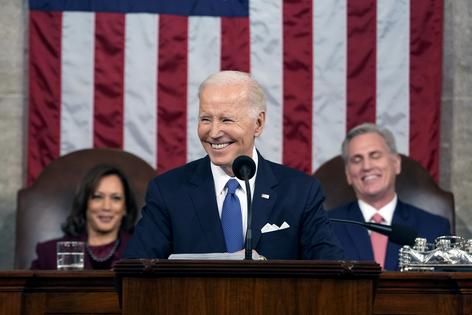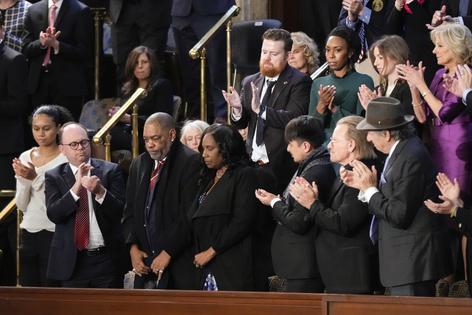State of the Union: What experts have said about Biden's proposed reforms on policing, guns and taxes – 8 essential reads
Published in Political News
The speech lasted 70-odd minutes and was interrupted at least 70 times, mostly by standing ovations from supporters, but also from occasional interjections from less sympathetic lawmakers.
There was also policy to dissect in President Joe Biden’s State of the Union address. Some of it was new, much of it wasn’t – which meant that The Conversation was able to pull from its archives articles that shed light on and provide context and analysis to some of Biden’s proposals. Here are what scholars had to say on three policy themes that emerged.
Biden may well have been planning to push for police reform in the State of the Union address before the recent release of footage showing police officers fatally beating Tyre Nichols. But that incident – the latest in a series of high-profile deaths of Black men at the hands of police – has again shined a light on the failure to address systemic problems in the nation’s policing.
In front of an audience that included Nichols’ mother and stepfather, the president called on Congress to “finish the job on police reform,” while referencing the George Floyd Justice in Policing Act – a bill that failed to pass into law amid gridlock in Congress.
The bill would have addressed some of the problems of U.S. policing. It includes a ban on racial profiling by all law enforcement agencies and an end to the “qualified immunity” that protects officers in civil lawsuits. It would also expand the powers of the Justice Department to hold departments to account over civil rights violations.
But, as Alexis Karteron, associate professor of law at Rutgers University – Newark, notes, it isn’t a sufficient fix. The problem is the federal government has only limited power when it comes to effecting change among the nearly 18,000 police departments in the U.S.
“For those looking to the federal government to solve what’s wrong with policing in America, federal legislation can’t ensure that every police department will make meaningful changes. That’s because the [George Floyd Justice in Policing Act] reflects the hard reality that the federal government has almost no control over state and local police departments,” Karteron writes. She adds that even if it is passed, the likelihood is some of those agencies would sue, “arguing that the federal government is attempting to coerce them into adopting policy reforms they do not need or want.”
Which is why some policing experts, such as Thaddeus L. Johnson and Natasha N. Johnson at Georgia State University, have suggested that reform is best undertaken at a local level. That would leave the federal government to play “a clear role in regard to financing reform and addressing nonpolicing issues that contribute to crime, such as underlying poverty and the lack of green spaces.”
Federal money could also help police departments recruit and train police officers. Biden in 2022, announced plans to add 100,000 officers nationwide as part of his policing plan. Research from criminologists Ian T. Adams of the University of South Carolina, Justin Nix of the University of Nebraska Omaha, and University of Utah’s Scott M. Mourtgos suggests that adding officers would help reverse a trend that has seen many leave the profession since the protests that followed George Floyd’s death. In Memphis, where Tyre Nichols was killed, police staffing has dropped by nearly a quarter in recent years.
Read more:
Read more:
Read more:
...continued











Comments